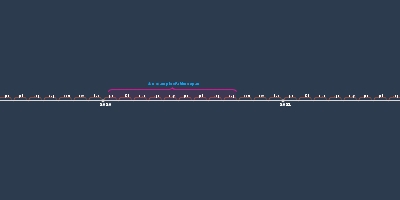Daniel 11 - Antiochus III & Ptolemy IV (1 jan 222 ano antes da era comum – 1 jan 204 ano antes da era comum)
Descrição:
Daniel 1110 “His sons shall wage war and assemble a multitude of great forces, which shall keep coming and overflow and pass through, and again shall carry the war as far as his fortress. 11 Then the king of the south, moved with rage, shall come out and fight against the king of the north. And he shall raise a great multitude, but it shall be given into his hand. 12 And when the multitude is taken away, his heart shall be exalted, and he shall cast down tens of thousands, but he shall not prevail. 13 For the king of the north shall again raise a multitude, greater than the first. And after some years he shall come on with a great army and abundant supplies. 14 “In those times many shall rise against the king of the south, and the violent among your own people shall lift themselves up in order to fulfill the vision, but they shall fail.
_____
Versebyverseministry.org by Stephen Armstrong
Eventually, Seleucus II dies and he is succeeded by his son, Seleucus III, who dies quickly, and is succeeded by his brother, Antiochus III the Great. These sons of Seleucus II sought to restore the glory of Syria lost to the Ptolemaic kings
_So each attacked Egypt during his reign
_Eventually, the Seleucids succeeded in driving the Ptolemaic Egyptians back into the Sinai
_These battles are described in vs.10
As a result, Ptolemy IV Philopator attacks Antiochus III at the new border in Southern Israel
_His attack was devastating, and he destroyed Antiochus III’s army
_But, Antiochus regrouped and stopped the advance
_In the end, Ptolemy IV Philopator recaptured just Palestine
_This campaign is described in vs.11-12
Antiochus will direct his military efforts in other directions for a while, rebuilding his forces against lesser adversaries
_But eventually, he returns to battle the Ptolemaic kingdom
_He succeeds in retaking Palestine in 203 BC
_This attack is described in v.13
_____
Wikipedia contributors. (2022, October 27). Ptolemy III Euergetes. In Wikipedia, The Free Encyclopedia. Retrieved 00:35, November 24, 2022, from https://en.wikipedia.org/w/index.php?title=Ptolemy_III_Euergetes&oldid=1118487143
Upon taking the Seleucid throne in 223 BC, Antiochus III the Great (241–187 BC) set himself the task of restoring the lost imperial possessions of Seleucus I Nicator, which extended from Greco-Bactrian Kingdom in the east, the Hellespont in the north, and Syria in the south. By 221 BC, he had re-established Seleucid control over Media and Persia, which had been in rebellion. The ambitious king turned his eyes toward Syria and Egypt.
Egypt had been significantly weakened by court intrigue and public unrest. The rule of the newly inaugurated Ptolemy IV Philopator (reigned 221–204 BC) began with the murder of queen-mother Berenice II. The young king quickly fell under the absolute influence of imperial courtiers. His ministers used their absolute power in their own self-interest, to the people's great chagrin.
Antiochus sought to take advantage of this chaotic situation. After an invasion in 221 BC failed to launch, he finally began the Fourth Syrian War in 219 BC. He recaptured Seleucia Pieria as well as cities in Phoenicia, amongst them Tyre. Rather than promptly invading Egypt, Antiochus waited in Phoenicia for over a year, consolidating his new territories and listening to diplomatic proposals from the Ptolemaic kingdom.
Meanwhile, Ptolemy's minister Sosibius began recruiting and training an army. He recruited not only from the local Greek population, as Hellenistic armies generally were, but also from the native Egyptians, enrolling at least thirty thousand natives as phalangites. This innovation paid off, but it would eventually have dire consequences for Ptolemaic stability. In the summer of 217 BC, Ptolemy engaged and defeated the long-delayed Antiochus in the Battle of Raphia, the largest battle since the Battle of Ipsus over eighty years earlier.
Ptolemy's victory preserved his control over Coele-Syria, and the weak king declined to advance further into Antiochus' empire, even to retake Seleucia Pieria. The Ptolemaic kingdom would continue to weaken over the following years, suffering from economic problems and rebellion. Nationalist sentiment had developed among the native Egyptians who had fought at Raphia. Confident and well-trained, they broke from Ptolemy in what is known as the Egyptian Revolt, establishing their own kingdom in Upper Egypt which the Ptolemies finally reconquered around 185 BC.
Adicionado na linha do tempo:
Data:
1 jan 222 ano antes da era comum
1 jan 204 ano antes da era comum
~ 18 years
